Quintana joins the forestry team in Shasta, Trinity and Siskiyou counties
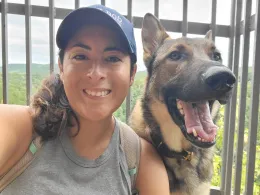
Camila Quintana Del Carpio joined UC Cooperative Extension on Sept. 15 as a forestry and natural resources advisor for Shasta, Trinity and Siskiyou counties. She will be a resource for forestland owners, professional foresters and anyone else interested in the management of California’s forest resources.
Quintana brings a wide range of skills from seven years of working for private industry and forestry consulting companies. She began her career marking timber, flagging watercourses and cruising for carbon projects, and grew into managing the reforestation program on 168,000 acres of timberland for FWS Forestry. She is a licensed pest control adviser and a California Registered Professional Forester (RPF #3192).
In May, she completed a master’s degree in forest resources, with an emphasis on forest business, at the University of Georgia. Her studies at the University of Georgia gave her the foundational business skills used by premier timber companies and insight into forestry practices from the leading lumber producing region of the United States. She holds a bachelor’s degree in forestry and environmental science from UC Berkeley.
With a passion for reforestation, she has participated in the Forest Vegetation Management Conference and the California Forest Pest Council, where she explored new opportunities for fundraising and chaired the committee for the annual woods tour.
Quintana, who grew up in the East Bay, brings a fresh perspective to Northern California forestry as an immigrant from Peru. With her fluency in Spanish, she has fostered connections with migrant reforestation workers, enhancing inclusiveness in California forestry.
“I am looking forward to working with forest landowners, registered professional foresters, agencies and others interested in forestry and natural resources,” she said.
Quintana is based at the UC Cooperative Extension office located in Redding and can be reached at caquintana@ucanr.edu and (530) 224-4900. She is on LinkedIn at https://www.linkedin.com/in/cquintanadelcarpio.
Teiken joins SAREP as associate director for small farms
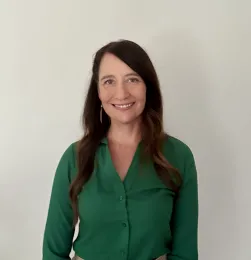
Carrie Teiken joined the Sustainable Agriculture, Research, and Education Program (SAREP) on Sept. 2 as the associate director for small farms. In this role, she will oversee the California Underserved and Small Producer Program as well as the small farms advisors and academic coordinators throughout the state.
Teiken brings over 15 years of experience supporting smallholder farmers both domestically and internationally. Most recently, she served for a decade as a Foreign Service Agriculture officer with the U.S. Agency for International Development (USAID), where she held leadership roles including deputy director for the Economic Growth Office in Senegal, Private Sector Investment and Agricultural Trade Lead in Tanzania, and Feed the Future Country Coordinator and Agriculture Team Lead in the Democratic Republic of Congo.
In these positions, Teiken designed and managed complex agricultural development programs focused on increasing farm productivity, improving access to finance, expanding market opportunities, promoting integrated pest management, and scaling innovative tools.
Prior to working for USAID, Teiken worked for the U.S. Department of Agriculture, serving in the Foreign Agricultural Service in Brussels, Belgium, and as a soil conservationist with the Natural Resources Conservation Service in Dixon, in Solano County.
She holds two master’s degrees from UC Davis – one in plant pathology, with research on citrus greening in Southern California, and another in international agricultural development. She also completed the Business Development Fellowship at the UC Davis Graduate School of Management.
Teiken’s roots in agriculture trace back to her undergraduate years at the University of Wisconsin – Madison, where she studied anthropology and environmental studies and spent summers working on a small farm called Tomato Mountain. She also served as a Peace Corps agriculture volunteer in Ghana, deepening her lifelong commitment to supporting small farmers and food systems around the world.
Teiken is based in Davis at the ANR building and can be reached at cteiken@ucanr.edu.
NPI welcomes Thompson as new director
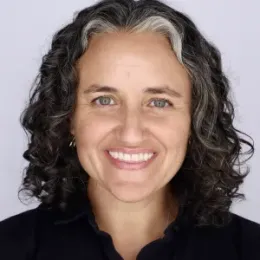
Hannah R. Thompson began her role as the new director of the Nutrition Policy Institute on Sept. 1. Thompson has served as NPI’s senior epidemiologist since 2020 while also working as an assistant research professor at the University of California, Berkeley School of Public Health. She earned her master’s of public health degree in Public Health Nutrition from UC Berkeley and her doctoral degree in Epidemiology and Translational Science from UC San Francisco.
Thompson's research focuses on improving cardiometabolic health at the intersection of science, community, and policy. Her focus is on youth-facing policies like mandated physical education, recess, and nutritious meals in public schools, as well as federal programmatic approaches like WIC, CACFP, and SNAP-Ed, that have tremendous potential for both short- and long-term health impact. Thompson will build on the legacy of NPI’s founding director Lorrene Ritchie, who retired on July 1.
Thompson noted that a defining legacy of NPI has been its influential research on major policies and programs – such as SNAP (Supplemental Nutrition Assistance Program) and WIC (Special Supplemental Nutrition Program for Women Infants and Children) – aimed at making people of all ages healthier and more food secure.
Thompson hopes to build on the institute’s innovations in research and program evaluation. In particular, she highlighted NPI’s emphasis on partnering with communities on public health initiatives that are tailored to their specific needs and circumstances.
“I feel strongly about continuing the legacy of community-based, participatory action research – doing work that is designed not just to end up in some academic journal, but that’s really going to inform policy and practice on the ground,” she said.
Thompson is based at UC Office of the President in Oakland and can be reached at hrthomp@ucanr.edu.
Read more about Thompson and her plans for NPI at https://ucanr.edu/blog/healthy-communities-blog/article/npidirector.
Vigil joins UCCE as livestock and natural resource advisor

Justin Vigil joined UC Cooperative Extension on Aug.18 as the livestock and natural resource advisor for Shasta and Trinity counties.
Vigil, who grew up on Dixie Valley Ranch, southeast of McArthur, in Lassen County, succeeds Larry Forero, who retired.
Vigil earned a bachelor’s degree in business economics from California State University, East Bay. Under the tutelage of Kasey DeAtley, Chico State University professor of animal science, Vigil conducted graduate research investigating bovine bone degradation in livestock mortality compost.
After earning a master’s degree in regenerative agriculture, Vigil found work not behind a desk, but on the back of a horse.
“For the last year, I worked for a horse trainer in Red Bluff and as a day worker on various ranches where I learned valuable lessons in horsemanship and forged connections with ranchers which will serve me in this new role,” Vigil said.
“As I step into this position, I am excited to meet individuals of the livestock and natural resource community, listen to questions or concerns, and develop research projects that provide conclusions that will improve the stewardship of livestock and natural resources,” he added.
Vigil is based at the UC Cooperative Extension office in Redding and can be reached at jusvigil@ucanr.edu and (530) 224-4900.
Hayashi joins UC ANR as web content administrator
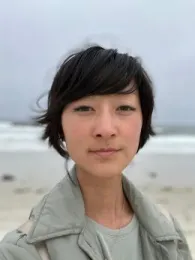
Heather Hayashi joined UC ANR as a web content administrator on Aug. 18. In this position, she will enhance digital content and web resources across UC ANR's statewide programs.
Hayashi brings over a decade of experience bridging research and community outreach through digital communications and information science across academic, government, nonprofit and private sector organizations.
Prior to joining UC ANR, she was communications manager for the UC Davis Feed the Future Innovation Lab for Horticulture, where she managed digital content for global food security initiatives.
Her background spans academic information science, community engagement, and visual communications throughout the UC system and California higher education. This experience, from creating research guides for diverse audiences to developing multilingual outreach materials, positions her uniquely to translate complex research into accessible community resources.
Hayashi holds a master’s degree in library science from Clarion University in Pennsylvania and a bachelor’s degree in design from UC Davis.
“I'm excited to leverage my background in information science and visual communications to enhance UC ANR’s digital resources, creating clear pathways between university research and the communities who can benefit from it,” Hayashi said.
Hayashi is based at the ANR building in Davis and can be reached at hnhayashi@ucanr.edu. She is on LinkedIn https://www.linkedin.com/in/heatherhayashi.
Pratt to lead SAREP sustainable production, UC Organic Agriculture Institute
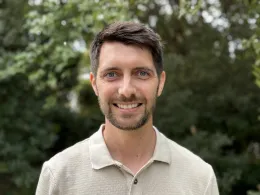
Orry Pratt joined UC SAREP on Aug. 11 as the associate director for sustainable production systems and the administrative director of the UC Organic Agriculture Institute. His work supports enhancing and expanding knowledge, outreach and technical assistance for all aspects of sustainability in agricultural production.
Pratt brings more than a decade of experience in international agriculture and economic development to this role. His career has focused on the application of conservation agriculture practices across different geographical, cultural, political and environmental contexts.
Pratt was most recently a foreign service officer with the US Agency for International Development (USAID) and served in Colombia. His efforts led to increased public and private sector investments in climate-smart agriculture value chains as a response to complex national issues around deforestation, illicit crops and violence.
Pratt served as an agriculture officer for the Food and Agriculture Organization (FAO) Subregional Office for Eastern Africa and was the region’s agriculture extension and crop production focal point. Pratt, who began his career with the FAO as a communications officer at its headquarters in Rome, also served as a Peace Corps volunteer in Paraguay.
Pratt received his bachelor’s degree in animal sciences from Penn State University and his master’s degree in agricultural leadership, education and communications from Texas A&M University. He is fluent in Spanish and has spoken several other languages throughout his career.
Pratt is based at the ANR building in Davis and can be reached at opratt@ucanr.edu.
Thaoxaochay becomes UCCE disaster resiliency, planning and policy advisor
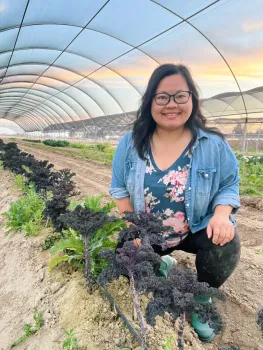
Lilian Thaoxaochay became the UC Cooperative Extension disaster resiliency, planning and policy advisor for San Luis Obispo, Santa Barbara and Ventura counties on July 1.
She joined UC ANR in 2021, working with the UCCE Small Farms team in Fresno County. For four years, she provided technical assistance for small-scale growers affected by COVID-19 and various extreme weather conditions including drought and flood. She assisted with research on specialty crop production projects including long beans, moringa and jujubes.
Thaoxaochay, whose family has a 20-acre farm in Fresno County, also provided program support and Hmong translation for irrigation efficiency, integrated pest management and soil health education.
Thaoxaochay holds a master’s degree in anthropology from UC Santa Cruz and bachelor’s degree in anthropology from Stanford University. She has a background in community organizing, policy, racial/ethnic health disparities and cultural competency in medical education, curriculum development, the history of agriculture in Southeast Asia, and refugee and immigrant farming in California.
Thaoxaochay is based in San Luis Obispo and can be reached at (805) 441-4119 and lilthaox@ucanr.edu.
Matteucci joins UC Master Food Preservers
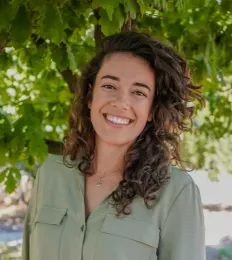
Kelsie Matteucci joined SAREP in June as a community education supervisor for the UC Master Food Preserver Program. In this role, she supports the statewide program manager and county coordinators in training volunteers and implementing educational programs across California.
Matteucci holds a master’s degree in climate science and policy from Scripps Institute of Oceanography and a bachelor’s degree in sustainability from San Diego State University.
She has dedicated her career to exploring sustainable food systems and sharing this knowledge with learners of all ages, emphasizing the benefits of local, seasonal eating.
Her background includes work with small-scale agricultural operations and educational cooking programs, experiences that have sharpened her food preservation skills. She has led a variety of community classes and events focused on building kitchen confidence, increasing food literacy and preserving the seasonal harvest in diverse ways. Matteucci is committed to expanding and strengthening farm to fork and food preservation education across the state.
Matteucci is based in Davis at the ANR building and can be reached at kmatteucci@ucanr.edu.
Baik to study mosquitoes at UC Davis
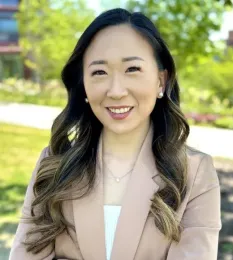
Lisa Baik has joined the Agricultural Experiment Station at UC Davis as an assistant professor of insect biology in the Department of Entomology and Nematology, where she will be studying mosquitoes.
Prior to joining UC Davis, she served as a postdoctoral researcher for six years in the Yale University Department of Molecular, Cellular and Developmental Biology, working in the lab of John Carlson, the Eugene Higgins Professor of Molecular, Cellular and Developmental Biology.
At Yale, Baik described the underlying taste perception in the invasive Asian tiger mosquito, Aedes albopictus; generated the first comprehensive map of taste neuron responses in mosquitoes and transcriptomic profiles of A. albopictus taste organs; and identified tastants that influence behaviors including biting, feeding and egg laying, including those that deter mosquitoes from biting, which could be directly useful in reducing the spread of disease-causing pathogens.
Baik’s interest in insects was piqued as a child.
“I grew up in the rural farmlands of South Korea and spent much of my childhood frolicking in the forest, the rice fields and chili pepper fields," Baik said. "I remember collecting a lot of cicadas, dragonflies, grasshoppers, beetles and moths. Mosquitoes were never among the insects that I collected as a child, but I do remember getting bitten a lot.”
Mosquito research both fascinates and captivates her. “Mosquitoes are the deadliest animal on earth. It still blows my mind that something so little can do so much. Most people just find them annoying, but they actually are so much worse than a nuisance. I’m also continually impressed by the complexity of their biology. They have had hundreds of millions of years to evolve into the deadly biters that they are and it’s been humbling and exciting to study them.”
She earned a doctorate in physiology and biophysics from UC Irvine, and bachelor’s degrees in neurobiology, physiology and behavior, and in psychology at UC Davis.
Baik is based at Briggs Hall at UC Davis and can be reached at lbaik@ucdavis.edu. She recently launched her lab website, “Fight the Bite,” at https://www.baiklab.com/.
Read more about Baik on Kathy Keatley Garvey’s Bug Squad.
